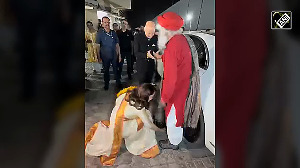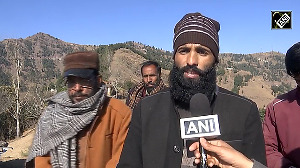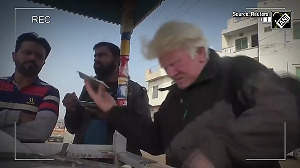US officials fear that should the firm evidence emerge that the Mumbai terror attacks were planned and directed from within Pakistan, it would certainly escalate tension between the neighbouring countries and could also provoke an Indian military response, even strikes against terrorists, a media report said on Saturday.
Quoting the officials in Washington, The New York Times said there was no evidence that Pakistani government had any role in the attacks.
But American intelligence and counter-terrorism officials told the paper that there is mounting evidence that a Pakistani militant group, most likely Lashkar-e-Tayiba, was responsible for deadly attacks in Mumbai.
An American counter-terrorism official was quoted as saying that there was strong evidence that LeT had a 'maritime capability' and would have been able to mount the sophisticated operation in Mumbai.
However, the officials, the Times said, cautioned that they had reached no firm conclusions about who was responsible for the attacks, or how they were planned and carried out.
Nevertheless, they said that evidence gathered in the past two days pointed to a role for LeT or possibly another terrorist group Jaish-e-Muhammad, which also has a track record of attacks against India.
American and Indian intelligence services, the Times said, have used communications intercepts to tie the Pakistan-based terrorists to the strikes.
Indian officials may also be gleaning information from at least one captured gunman who participated in the Mumbai attacks.
The paper quoted an Indian intelligence official as saying that during the siege, the terrorists have been using non-Indian cellphones and receiving calls from outside the country, evidence that in part led Indian officials to speak publicly about the terrorists' external ties.
The LeT denied any responsibility for the terrorist strikes.
But American intelligence agencies were quoted as saying that the group has received some training and logistic support in the past from Pakistan's powerful spy service ISI, and that Pakistan's government has long turned a blind eye to the LeT camps on the Kashmir border.
American and Indian officials, the paper said, were pursuing the possibility that the attackers arrived off the coast of Mumbai in a large ship and then boarded smaller boats before initiating their attack.
They have for years blamed LeT for a campaign of violence against high-profile targets throughout India, including the December 2001 attack on Indian Parliament and an August 2007 strike at an amusement park in Hyderabad, the paper said, noting that at times, Indian officials have also said Jaish-e-Muhammad was responsible for the attack on Parliament.
That attack prompted the Bush administration to try to freeze LeT's assets and press Gen Pervez Musharraf, Pakistan's President at the time, to crack down on the group's training operations in Pakistan, the paper recalled.
A State Department report released this year called LeT 'one of the largest and most proficient of the Kashmir-focused militant groups'.
The report said that the LeT drew financing in part from Pakistani expatriates in the Middle East, and that it used a front organisation called Jamaat ud-Daawa to coordinate charitable activities.
It said the actual size of the group was unknown, but estimated it at 'several thousand' members, the paper noted.
Recently, the Times said, some of the group's operations have shifted from Kashmir to Pakistan's Federally Administered Tribal Areas and even to Afghanistan to attack US troops.
American officials and terrorism experts were quoted as saying that the group had not sent large numbers of operatives into Afghanistan, but had embedded small teams with Taliban units to gain fighting experience.
'Afghanistan is an operating war zone, so they can get active training as the Kashmir front has slowed down a bit,' the Times quoted Seth Jones, a terrorism expert at the RAND Corporation, as saying.
The group is believed by experts to have at least a loose affiliation with Al-Qaeda, the paper said, adding that in March 2002, a Qaeda lieutenant, Abu Zubaydah, was captured in an LeT safe house in Faisalabad, Pakistan.
Lashkar-e-Toiba is not known to have singled out Westerners in past terrorist attacks, as the gunmen in Mumbai seem to have done. But one counter-terrorism official told the paper that the group 'has not pursued an exclusively Kashmiri agenda' and that it might certainly go after Westerners to advance broader goals.






 © 2025
© 2025